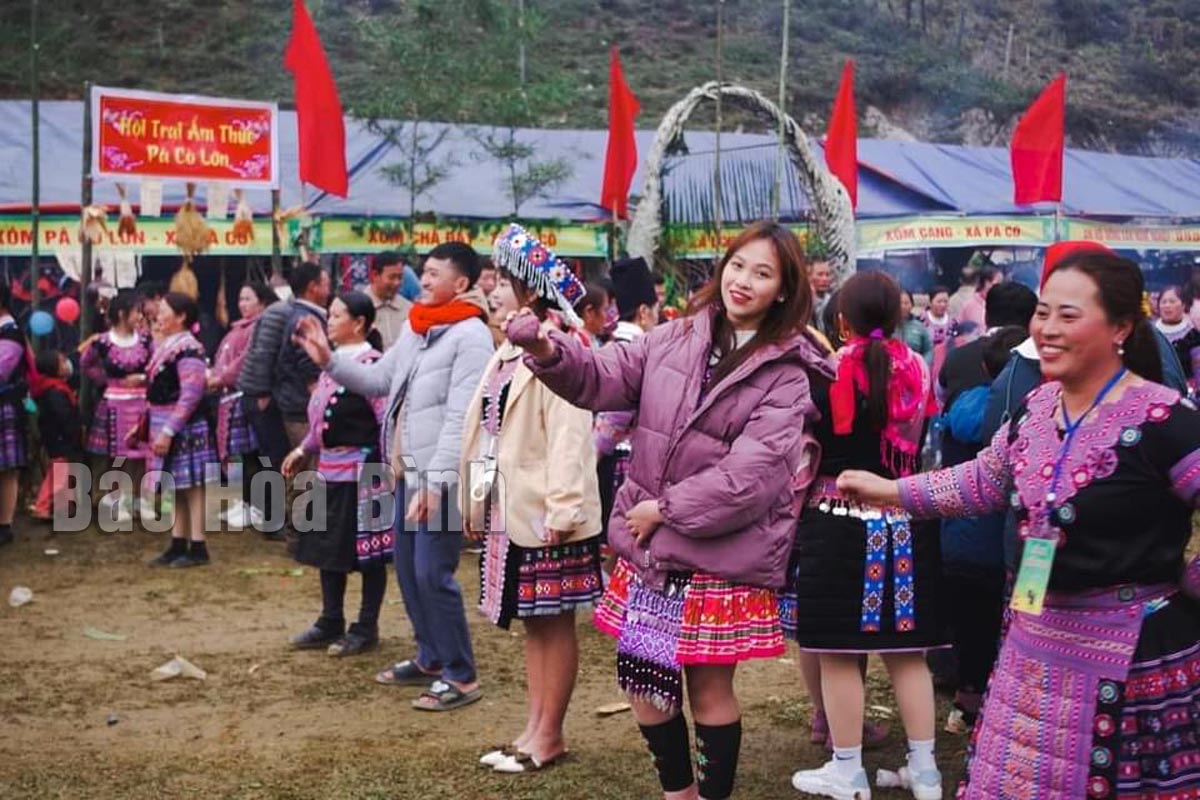
(HBO) - As the most typical traditional festival of the Mong ethnic group, the annual Gau Tao festival takes place at the beginning of the Lunar New Year. The two communes of Hang Kia and Pa Co, Mai Chau district hold the festival to express gratitude to the heaven and the earth and pray for peace, prosperity and good health.
Photo:Tourists
and locals join the ball-throwing event (nem pao) in Gau Tao festival in Pa Co
and Hang Kia communes, Mai Chau district.
This year, the festival was held on a larger scale in a joyful atmosphere to
celebrate the Year of the Cat. It drew the participation of a large number of
visitors across the country and foreign tourists.
Xa Linh stadium in Pa Co commune was chosen as the venue for the festival which
opened with the presence of more than 6,000 residents and visitors.
According to Sung A Chua, Vice Chairman of Pa Co Commune People's Committee,
head of the event’s organising committee, the organisation of the festival
meets the aspirations and spiritual life of the people, aiming to honour
cultural identity of the Mong ethnic group. It also contributes to promoting
the image, people, history and culture of the highland region and speeding up
tourism development.
Erecting a bamboo pole, known as a neu tree, is the most important ritual of
the festival. It is erected on a large and flat ground which reflects stability
and is also a symbol of the sacred tree connecting heaven and earth. Shamans
burn incense and put offerings around the tree to pray for favourable weather
and people's prosperity in the new year.
This year's festival attracted a lot of visitors as it lasted for three days
with the organisation of many activities. Right after the opening of the
festival, boys and girls of the Mong ethnic group and tourists, hand in hand,
joined a Xoe dance to show their solidarity.
Visitors to the festival were also fascinated by folk games and experiential
activities.
Susanne, a tourist from Germany, said the atmosphere of the Gau
Tao festival is wonderful as everyone has fun and participates in interesting
games.
She described the trip as an unforgettable experience about the
land, people, and cultural identity of the Mong ethnic group in Mai Chau
district.
The Gau Tao festival offers a chance for the Mong people who work far away from
home to return to their homeland, to gather and welcome the new year.
Coming to the festival, visitors can enjoy cultural performances
imbued with the identity of Mong people in such games as throwing balls or
walking on stilts. This is also an opportunity for Mong boys to show off their
talent in dancing and playing panpipes./.
A diverse chain of eco-tourism and resort destinations concentrated in Hoa Binh city and the districts of Tan Lac, Da Bac, and Luong Son… Along with the launch of several key high-quality resort tourism projects, these developments have reshaped the landscape and enhanced the appeal of Hoa Binh as a travel destination.
Boasting diverse terrain, a mild climate, and rich natural resources, Cao Phong district is increasingly asserting its place on Vietnam’s tourism map, attracting both domestic and foreign visitors. The district is renowned for its stunning landscapes, majestic mountains, a crystal-clear hydropower lake, and the unique cultural identity of local ethnic groups.
With its pristine landscapes, unique cultural heritage of Muong ethnic minority, and an expanding range of visitor experiences, Tan Lac district of Hoa Binh has fast become a captivating destination for both domestic and international tourists.
Until now, Sung village in Cao Son commune, Da Bac district remains the only Dao ethnic community in Hoa Binh province to develop a community-based tourism model. Beyond its untouched natural landscapes, cultural identity serves as the cornerstone attraction for visitors.
Alongside the diverse cultural identities of the Kinh, Muong, Tay, Thai, Dao, and Mong ethnic people, Hoa Binh province is also renowned as the "capital" of the northwestern Vietnamese cuisine, offering unique and distinctive dishes. At festivals, during Lunar New Year (Tet), or on significant family or community occasions, special dishes are prepared, leaving a lasting impression on visitors.
A Phong Linh (Yellow Tabebuia) flower garden in Thang village, Thach Yen commune, Cao Phong district is currently in full bloom, drawing a large number of visitors.



